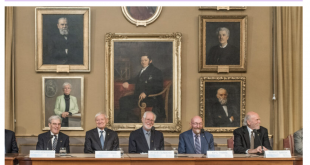T Sabri Öncü ([email protected]) is an economist based in İstanbul, Turkey. This article was first published in the Indian journal the Economic and Political Weekly (EPW) on 28 September 2019.Summary: With intensifying concerns regarding the soundness and stability of the international monetary and financial system, calls for reforming it have been on the rise. One recent call was made by the Bank of England Governor Mark Carney, in August 2019, in which he suggested a...
Read More »How the sexist ‘Nobel Prize’ in economics has warped the world
The following hastily written piece appeared in Left Foot Forward on 25th September, 2019.The Nobel Memorial Prize in Economics will be 50 years old next month. One thing unites all its winners, bar one: they have all been male.This is not just an affront to equality. In overlooking brilliant female economists, the Swedish Central Bank’s Nobel has neglected economic theory which could have helped prevent the turmoil of regular financial shocks and political trauma.The...
Read More »Trudeau’s proposed speculation tax
I’ve written a blog post about the Trudeau Liberals’ recently-proposed speculation tax on residential real estate owned by non-resident, non-Canadians. The full blog post can be accessed here. Nick Falvo is a Calgary-based research consultant with a PhD in Public Policy. He has academic affiliation at both Carleton University and Case Western Reserve University, and is Section Editor of the Canadian Review of Social Policy/Revue canadienne de politique sociale. You can...
Read More »Trudeau’s proposed speculation tax
Posted by Nick Falvo under BC, bubble, cities, economic thought, foreign investment/ownership, globalization, housing, inequality, interest rates, investment, Liberal Party policy, monetary policy, municipalities, Ontario, party politics, prices, private equity, regulation, Role of government, taxation, Toronto, wealth. September 25th, 2019Comments: none I’ve written a blog post about the Trudeau Liberals’ recently-proposed speculation tax on residential real estate owned...
Read More »Bill Mitchell — Is the British Labour Party aboard the fiscal dominance train – Part 1?
As I type this (Sunday), I am heading to Brighton, England from Edinburgh. We had two sessions in Edinburgh yesterday (Saturday) and it was great to share ideas with some really committed people. We had to dodge a Hollywood closure of the streets (‘Fast and Furious 9 had commandeered the inner city to film a car or two swerving out of control or whatever, and I hope the city received heaps for the inconvenience to its citizens. But, with the direction now south, and tomorrow’s two events...
Read More »TASS — Russia’s Central Bank cuts key rate to 7% for first time since 2014
Interest rates represent cost of borrowing and income from saving. Both are reduced by cutting rates. Since is this is a decrease in price, it is disinflationary, which is opposite to what central bankers assume. Savers receive less income, which would likely have been spent on goods purchases. Lower of the cost of firm investment potentially results in lower goods prices. On the other hand, in deciding on a monetary policy using interest rate setting, central banks assume that lower...
Read More »Rethinking Britain – How to build a better future
By Sue Konzelmann, John Weeks and Marc Fovargue-Davies ‘Rethinking Britain: Policy Ideas for the Many’ is a publication of Policy Press (19 September 2019), in partnership with PRIME and the Progressive Economic Forum (PEF). Price £14.99, pre-orders £11.99 via Bristol University Press website. It is edited by Sue Konzelmann, Susan Himmelweit,...
Read More »Milton Friedman’s Thermostat, redux — Jason Smith
Pesky physicists. ?Jason Smith "converses" with Milton Friedman.Short, fun, and not wonkish.Information Transfer EconomicsMilton Friedman's Thermostat, reduxJason Smith
Read More »Is Fiscal The New Monetary? — Nicola Mai, Peder Beck-Friis
Curiously, no mention of MMT. But useful for the analysis showing that monetary policy is not cutting it and that fiscal policy will inevitably gain in prominence. It is now pretty widely recognized that the period of monetarism spearheaded by Milton Friedman (and the Chicago School) as the "successor" of John Maynard Keynes as international policy guru is over. The question now is, who will the new gurus be? Will the pendulum swing back to Cambridge and Wynn Godley?FA — Financial...
Read More »Whither Central Banking? Lawrence H. Summers
In an environment of secular stagnation in the developed economies, central bankers’ ingenuity in loosening monetary policy is exactly what is not needed. What is needed are admissions of impotence, in order to spur efforts by governments to promote demand through fiscal policies and other means. Throwing in the towel (but not endorsing MMT). Politically, this is about control of the Democratic Party after the transition from Clinton-Obama-Third Way. Summers is on the side of the...
Read More » Heterodox
Heterodox



